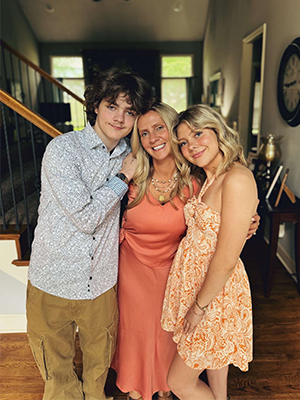A Voice for Mental Health
Mental health became a priority for Charlee through her own lived experiences. When her younger brother began experiencing psychosis, everything changed, reshaping her family’s dynamic. “It’s hard to describe psychosis, but from my perspective, it was like watching my brother become a completely different person—the person he was seemed to vanish,” Charlee explains. “When someone passes away, people send condolences, they acknowledge the loss. But with severe mental illness, people don’t always know how to react. Life just keeps moving—you don’t get time off work, and there’s no clear way to grieve.”
Seeking support for both her brother and themselves, her family started looking for guidance and resources. They discovered NAMI, which offers educational programs on different mental health conditions. “Through those programs, my family connected with others who have been through similar experiences, and that support has been invaluable,” Charlee says.
When Charlee later started college at K-State, she sought out mental health support groups on campus but found limited options. Already familiar with NAMI, she reached out to the organization to learn how to start an On Campus Club. "For me, the only way I’ve been able to get through my own journey with mental health is by talking to people about it,” Charlee explains. “Mental health can be such a nuanced conversation and having a space on campus where students—who are in the same stage of life, living in the same area and facing similar challenges—can connect is so important. When you go to college, you become more independent, and in many ways, your own support system. That’s why it’s crucial to find others who understand and can offer support.”
Charlee envisions the club as a safe and supportive space where collegians can openly share their experiences and have honest discussions about mental health. She hopes to break the stigma surrounding nuanced disorders like schizophrenia, bipolar disorder and depression, ensuring anyone in the club feels comfortable seeking support without fear of judgment. “I want others to know that resources exist, help is available and—most importantly—asking for help shouldn’t be so difficult,” Charlee says.
The response from her fellow collegians to the idea of a NAMI On Campus Club has been very encouraging, Charlee says. Members of Acacia Fraternity, who had previously reached out to NAMI about bringing a club to campus, are eager to collaborate, and her Kansas Beta sisters are excited to support and get involved in any way they can. “I’m lucky to have an incredibly supportive circle—especially within Pi Phi,” Charlee says. “After giving a presentation about NAMI to my chapter, so many people have opened up to me about their own experiences or asked how they can get involved. The response has been overwhelmingly positive.”
As Director Community Inclusion for her chapter, Charlee hopes to make mental health awareness a key part of her role. As she deepens her involvement with NAMI, she’s eager to bring what she learns to Pi Phi, creating more opportunities for open conversations. “Living in a chapter house can sometimes feel like living on an Instagram feed—everything looks perfect on the outside, but that’s not always reality,” Charlee says. “People don’t always talk about what they’re going through, and I want to change that. I want my sisters to know that whatever they’re dealing with, they’re not alone. I’ve already been that person for some, but more than anything, I want to create a space where everyone feels safe and supported in their mental health journey."
Charlee has led by example, being vulnerable with her Phi sisters and asking for support during difficult times with her family. “I’ve been blown away by how much love and support I’ve received—especially when I opened up about NAMI and my brother’s experience with psychosis,” Charlee shares. “Sharing my story was scary, but my Pi Phi sisters responded with nothing but kindness. I couldn’t do this without them.”
As we honor Mental Health Awareness Month, we invite you to explore the Spring 2025 issue of The Arrow, which takes a closer look at mental health across our sisterhood, with a special focus on navigating anxiety. Read the issue at pibetaphi.org/thearrow.
Published May 13, 2025


